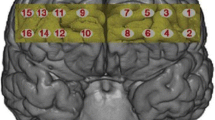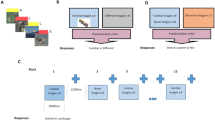Abstract
Rationale
3,4-Methylenedioxymethamphetamine (MDMA, ecstasy) is neurotoxic in animal studies and its use has been associated with cognitive impairments in humans.
Objective
To study hippocampal activation during the retrieval from episodic memory in polyvalent users of ecstasy.
Methods
Twelve polyvalent ecstasy users and twelve matched controls were examined by means of functional magnetic resonance imaging (fMRI) while they retrieved face-profession associations from episodic memory.
Results
Ecstasy users had a normal structural MRI scan without focal brain lesions or anatomical abnormalities. They exhibited equal retrieval accuracy during memory retrieval to that of the matched controls. Yet, their retrieval-related activity was lower and more spatially restricted in the left anterior hippocampus than that of the controls.
Conclusions
These results provide evidence for abnormal hippocampal functioning in MDMA users even at the presence of normal memory performance. This finding may be linked to MDMA-induced neurotoxicity and suggests that diminished hippocampal activation during memory retrieval might be a more sensitive or earlier index of MDMA-related neurotoxicity than neuropsychological performance.

Similar content being viewed by others
References
Bäckman L, Andersson JL, Nyberg L, Winblad B, Nordberg A, Almkvist O (1999) Brain regions associated with episodic retrieval in normal aging and Alzheimer’s disease. Neurology 52:1861–1870
Bhattachary S, Powell JH (2001) Recreational use of 3,4-methylenedioxymethamphetamine (MDMA) or “ecstasy”: evidence for cognitive impairment. Psychol Med 31:647–658
Bolla KI, McCann UD, Ricaurte GA (1998) Memory impairment in abstinent MDMA (“Ecstasy”) users. Neurology 51:1532–1537
Bookheimer SY, Strojwas MH, Cohen MS, Saunders AM, Pericak-Vance MA, Mazziotta JC, Small GW (2000) Patterns of brain activation in people at risk for Alzheimer’s disease. N Engl J Med 17:502–503
Buhot MC, Martin S, Segu, L (2000) Role of serotonin in memory impairment. Ann Med 32:210–221
Cowan RL, Lyoo IK, Sung SM, Ahn KH, Kim MJ, Hwang J, Haga E, Vimal RL, Lukas SE, Renshaw PF (2003) Reduced cortical gray matter density in human MDMA (Ecstasy) users: a voxel-based morphometry study. Drug Alcohol Depend 72:225–235
Curran HV, Travill RA (1997) Mood and cognitive effects of ±3,4-methylenedioxymethamphetamine (MDMA, “ecstasy”): week-end “high” followed by mid-week low. Addiction 92:821–831
Dafters RI, Duffy F, O’Donnell PJ, Bouquet C (1999) Level of use of 3,4-methylenedioxymethamphetamine (MDMA or Ecstasy) in humans correlates with EEG power and coherence. Psychopharmacology 145:82–90
Daumann J, Fimm B, Willmes K, Thron A, Gouzoulis-Mayfrank E (2003) Cerebral activation in abstinent ecstasy (MDMA) users during a working memory task: a functional magnetic resonance imaging (fMRI) study. Brain Res Cogn Brain Res 16:479–487
Daumann J, Fischermann T, Pilatus U, Thron A, Moeller-Hartmann W, Gouzoulis-Mayfrank E (2004) Proton magnetic resonance spectroscopy in ecstasy (MDMA) users. Neurosci Lett 362:113–116
Fischer C, Hatzidimitriou G, Wlos J, Katz J, Ricaurte G (1995) Reorganization of ascending 5-HT axon projections in animals previously exposed to the recreational drug 3,4-methylenedioxymethamphetamine (MDMA, Ecstasy). J Neurosci 15:5476–5485
Fox HC, McLean A, Turner JJD, Parrott AC, Rogers R, Sahakian BJ (2002) Neuropsychological evidence of a relatively selective profile of temporal dysfunction in drug-free MDMA (“ecstasy”) polydrug users. Psychopharmacology 162:203–214
Gould E (1999) Serotonin and hippocampal neurogenesis. Neuropsychopharmacology 21:46S–51S
Gouzoulis-Mayfrank E, Daumann J, Tuchtenhagen F, Pelz S, Becker S, Kunert H-J, Fimm B, Sass H (2000) Impaired cognitive performance in drug-free recreational ecstasy (MDMA) users. J Neurol Neurosurg Psychiatry 68:719–725
Gouzoulis-Mayfrank E, Timm B, Rezk M, Hensen G, Daumann J (2003) Memory impairment suggests hippocampal dysfunction in abstinent ecstasy users. Prog Neuropsychopharmacol Biol Psychiatry 27:819–827
Guo Q, Fu W, Sopher BL, Miller MW, Ware CB, Martin GM, Mattson MP (1999) Increased vulnerability of hippocampal neurons to excitotoxic necrosis in presenilin-1 mutant knock-in mice. Nat Med 5:101–107
Hatzidimitriou G, McCann UD, Ricaurte G (1999) Altered serotonin innervation patterns in the forebrain of monkeys treated with 3,4-methylenedioxymethamphetamine seven years previously: factors influencing abnormal recovery. J Neurosci 19:5096–5107
Henke K, Buck A, Weber B, Wieser HG (1997) Human hippocampus establishes associations in memory. Hippocampus 7:249–256
Henke K, Treyer V, Nagy ET, Kneifel S, Dursteler M, Nitsch RM, Buck A (2003) Active hippocampus during nonconscious memories. Conscious Cogn 12:31–48
Jacobson LK, Mencl WE, Pugh KR, Skudlarski P, Krystal JH (2004) Preliminary evidence of hippocampal dysfunction in adolescent MDMA (“ecstasy”) users: possible relationship to neurotoxic effects. Psychopharmacology 173:383–390
McCann UD, Szabo Z, Scheffel U, Dannals RF, Ricaurte GA (1998) Positron emission tomographic evidence of toxic effect of MDMA (“Ecstasy”) on brain serotonin neurons in human beings. Lancet 352:1433–1437
McCann UD, Mertl M, Eligulashvili V, Ricaurte GA (1999) Cognitive performance in 3,4-methylenedioxymethamphetamine (MDMA, ecstasy) users: a controlled study. Psychopharmacology 143:417–425
McCann UD, Eligulashvili V, Ricaurte GA (2000) 3,4-Methylenedioxymethamphetamine (Ecstasy)-induced serotonin neurotoxicity: clinical studies. Neuropsychobiology 42:11–16
McCardle K, Luebbers S, Carter JD, Croft RJ, Stough C (2004) Chronic MDMA (ecstasy) use, cognition and mood. Psychopharmacology 173:434–439
Morgan MJ (1998) Recreational use of “ecstasy” (MDMA) is associated with elevated impulsivity. Neuropsychopharmacology 19:252–264
Morgan MJ (1999) Memory deficits associated with recreational use of “ecstasy” (MDMA). Psychopharmacology 141:30–36
Parrott AC, Lasky J (1998) Ecstasy (MDMA) effects upon mood and cognition:before, during and after a Saturday night dance. Psychopharmacology139:261–268
Reneman L, Lavalaye J, Schmand B, de Wolff FA, van den Brink W, den Heeten GJ, Booij J (2001) Cortical serotonin transporter density and verbal memory in individuals who stopped using 3,4-methylenedioxymethamphetamine (MDMA or “Ecstasy”). Arch Gen Psychiatry 58:901–906
Ricaurte GA, Martello AL, Katz JL, Martello MB (1992) Lasting effects of MDMA on central serotonergic neurons in nonhuman primates: neurochemical observations. J Pharmacol Exp Ther 261:616–622
Ricaurte GA, Yuan J, McCann UD (2000) 3,4-methylenedioxymethamphetamine (Ecstasy)-induced serotonin neurotoxicity: studies in animals. Neuropsychobiology 42:5–10
Riedel WJ, Klaasen T, Deutz NEP, van Someren A, van Praag HM (1999) Tryptophan depletion in normal volunteers produces selective impairment in memory consolidation. Psychopharmacology 141:362–369
Rodgers J (2001) Cognitive performance amongst recreational users of “ecstasy”. Psychopharmacology 151:19–24
Talairach J, Tournoux P (1988) Co-planar stereotaxic atlas of the human brain. Thieme, Stuttgart
Verkes RJ, Gijsman HJ, Pieters RC, de Visser S, Kuijpers M, Pennings JM, de Bruin D, van de Winjngaart G, van Grven JMA, Cohen AF (2001) Cognitive performance and serotonergic function in users of ecstasy. Psychopharmacology 153:196–202
Vertes RP, Kocsis B (1997) Brainstem-diencephalo-septohippocampal systems controlling the theta rhythm of the hippocampus. Neuroscience 81:893–899
Villemagne V, Yuan J, Wong DF, Dannals RF, Hatzidimitrou G, Matthews WB, Ravert HT, Musachio J, McCann UD, Ricaurte GA (1998) Brain dopamine neurotoxicity in baboons treated with doses of methamphetamine comparable to those recreationally abused by humans: evidence from [11C] WIN 35,428 positron emission tomography studies and direct in vitro determinations. J Neurosci 18:419–427
Volkow ND, Fowler JS (2002) Application of imaging technologies in the investigation of drug addiction. In: Davis KL, Charney D, Coyle JT (eds) Neuropsychopharmacology: the fifth generation of progress, An official publication of the American College of Neuropsychopharmacology. Lippincott Williams & Wilkins, Philadelphia, pp 1475–1490
Wareing M, Fisk JE, Murphy PN (2000) Working memory deficits in current and previous users of MDMA (“ecstasy”). Br J Psychol 91:181–188
Wareing M, Murphy PN, Fisk JE (2004) Visuospatial memory impairments in users of MDMA (‘ecstasy’). Psychopharmacology 173:391–397
Zakzanis KK, Young DA (2001a) Memory impairment in abstinent MDMA (“ecstasy”) users: a longitudinal investigation. Neurology 56:966–969
Zakzanis KK, Young DA (2001b) Executive function in abstinent MDMA (“ecstasy”) users. Med Sci Monit 7:1292–1298
Zakzanis K, Young DA, Radkhoshnoud NF (2002) Attentional processes in abstinent methylenedioxymethamphetamine (ecstasy) users. Appl Neuropsychol 9:84–91
Acknowledgement
This work was supported by a grant to E. Gouzoulis-Mayfrank from the Deutsche Forschungsgemeinschaft (DFG GO 717/4-1).
Author information
Authors and Affiliations
Corresponding author
Rights and permissions
About this article
Cite this article
Daumann, J., Fischermann, T., Heekeren, K. et al. Memory-related hippocampal dysfunction in poly-drug ecstasy (3,4-methylenedioxymethamphetamine) users. Psychopharmacology 180, 607–611 (2005). https://doi.org/10.1007/s00213-004-2002-8
Received:
Accepted:
Published:
Issue Date:
DOI: https://doi.org/10.1007/s00213-004-2002-8




